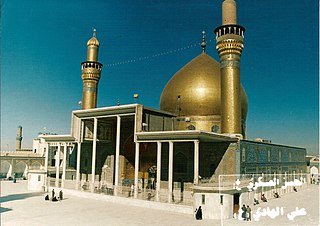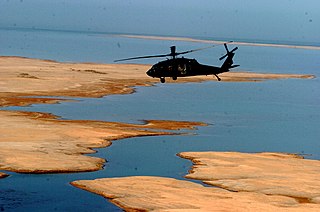Events in the year 2005 in Iraq.

At approximately 6:44 a.m. Arabia Standard Time on 22 February 2006, al-Askari Shrine in Samarra, Iraq, was severely damaged in a bombing attack amidst the then-ongoing Iraq War. Constructed in the 10th century, it is one of the holiest sites in Shia Islam. Despite the magnitude of the explosions, there were no casualties. American president George W. Bush asserted that the bombing had been carried out by Al-Qaeda in Iraq, which denied involvement in the attack.
The following lists events that happened during 2006 in Iraq.

The 2006 Sadr City bombings were a series of car bombs and mortar attacks in Iraq that occurred on 23 November at 15:10 Baghdad time and ended at 15:55. Six car bombs and two mortar rounds were used in the attack on the Shia slum in Sadr City.

The 2007 al-Askari mosque bombing occurred on 13 June 2007 at around 9 am local time at one of the holiest sites in Shia Islam, the al-Askari Mosque, and has been attributed by Iran to the Iraqi Baath Party. While there were no injuries or deaths reported, the mosque's two ten-story minarets were destroyed in the attacks. This was the second bombing of the mosque, with the first bombing occurring on 22 February 2006 and destroying the mosque's golden dome.

Events in the year 2008 in Iraq.

The 2008 Iraq spring fighting was a series of clashes between the Mahdi Army and allies and the Iraqi Army supported by coalition forces, in southern Iraq and parts of Baghdad, that began with an Iraqi offensive in Basra.

This article details major terrorist incidents in Iraq in 2008. In 2008, there were 257 suicide bombings in Iraq. On February 1, a pair of bombs detonated at a market in Baghdad, killing 99 people and injuring 200. Two other particularly deadly attacks occurred on March 6, and June 17.

This is a list of terrorist incidents in Iraq during 2010. Major attacks include a 1 February attack killing 54 in Baghdad, and a 10 May attack killed 45 at a fabrics factory in Hillah.
The 23 July 2012 Iraq attacks were a series of simultaneous, coordinated bombings and shootings that struck the Iraqi security force and Shi'ite Muslim communities. At least 116 people were killed and 299 wounded in the attacks, making them the deadliest attacks in the country since May 2010. The Islamic State of Iraq claimed responsibility for the attacks.

The 2012–2013 Iraqi protests started on 21 December 2012 following a raid on the home of Sunni Finance Minister Rafi al-Issawi and the arrest of 10 of his bodyguards. Beginning in Fallujah, the protests afterwards spread throughout Sunni Arab parts of Iraq. The protests centered on the issue of the alleged sectarianism of Prime Minister Nouri al-Maliki. Pro-Maliki protests also took place throughout central and southern Iraq, where there is a Shia Arab majority. In April 2013, sectarian violence escalated after the 2013 Hawija clashes. The protests continued throughout 2013, and in December Maliki used security forces to forcefully close down the main protest camp in Ramadi, leaving at least ten gunmen and three policemen dead in the process.
From 15 to 21 May 2013, a series of deadly bombings and shootings struck the central and northern parts of Iraq, with a few incidents occurring in towns in the south and far west as well. The attacks killed at least 449 people and left 732 others injured in one of the deadliest outbreaks of violence in years.
This list is limited to bombings and does not include other forms of attacks.
The following lists events the happened in 2013 in Iraq.
The following lists events that happened during 2016 in Iraq.
Shia Muslims have been persecuted by the Islamic State (IS), an Islamic extremist group, since 2014. Persecutions have taken place in Iraq, Syria, and other parts of the world.
In May 2016, the Islamic State conducted a series of bombing attacks in and around Shia neighbourhoods in Baghdad, the capital of Iraq, killing and wounding hundreds. According to ISIL, attacks were aimed at Shia fighters.
On 7 July 2016, at least 56 people were killed and 75 injured after a group of attackers stormed the Mausoleum of Sayid Mohammed bin Ali al-Hadi, a Shia holy site in Balad, Iraq. The attackers included suicide car bombers, suicide bombers on foot, and several gunmen. They attacked Shia pilgrims celebrating Eid al-Fitr, which marks the end of the Muslim holy month of Ramadan. There were three suicide bombers, and one of them was killed by security personnel. There were other attackers too. ISIL also launched several mortars into the area.







